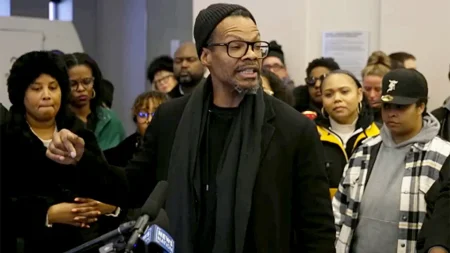Palestinian Authority President Denied U.S. Visa, Forced to Miss UN General Assembly
Diplomatic Tensions Escalate as Trump Administration Blocks Palestinian Leader’s Entry
In an unprecedented diplomatic move that has sent ripples through international relations circles, the President of the Palestinian Authority has been barred from attending this year’s United Nations General Assembly after the Trump administration denied his visa application. This decision marks a significant escalation in the already strained relationship between Washington and Palestinian leadership, raising serious questions about diplomatic protocols and the United States’ role as host nation to the UN headquarters.
The visa denial comes at a particularly critical moment in Middle Eastern politics, as world leaders prepare to gather in New York for what many consider the premier annual forum for international diplomacy. The General Assembly, which brings together heads of state and government representatives from the UN’s 193 member nations, serves as a vital platform for nations to address global challenges, forge diplomatic relationships, and present their perspectives on pressing international issues. By preventing the Palestinian Authority president from participating, the Trump administration has effectively silenced a key voice in discussions regarding one of the world’s most enduring conflicts.
Historical Context and Shifting U.S. Policy in the Middle East
The relationship between the United States and Palestinian leadership has undergone dramatic transformations in recent years, particularly since President Trump took office. Historically, while maintaining strong support for Israel, the U.S. had positioned itself as a mediator in the Israeli-Palestinian conflict, advocating for a two-state solution and maintaining diplomatic channels with both parties. However, the Trump administration has made several consequential policy shifts that have fundamentally altered this approach, including recognizing Jerusalem as Israel’s capital, relocating the U.S. Embassy from Tel Aviv to Jerusalem, cutting hundreds of millions in aid to Palestinian programs, and closing the Palestinian diplomatic mission in Washington.
These policy changes have been interpreted by many international observers as abandoning America’s previous stance as a neutral mediator. The Palestinian leadership has consistently expressed frustration with what they perceive as increasingly one-sided American policies that favor Israeli interests. Following the Jerusalem embassy move, Palestinian officials declared they would no longer accept the United States as the sole mediator in peace negotiations, arguing that Washington had compromised its neutrality. Against this backdrop, the visa denial appears to many analysts as the latest in a series of measures designed to marginalize Palestinian diplomatic efforts on the world stage.
Legal Questions and UN Host Country Obligations
The visa denial raises complex questions regarding the United States’ legal obligations as host country to the United Nations headquarters. Under the 1947 UN Headquarters Agreement, the U.S. committed to permitting access to the UN for foreign representatives, regardless of the state of bilateral relations between the United States and any particular member state. This agreement has traditionally been interpreted to mean that even representatives from countries with which the U.S. has strained or non-existent diplomatic relations should be granted entry for the purpose of UN business.
“This situation creates a troubling precedent,” explained Dr. Elena Monteiro, professor of international law at Georgetown University. “The host country agreement exists precisely to ensure that the UN can function as a truly global forum where all voices can be heard, including those with whom the host nation disagrees. When the United States selectively applies visa restrictions to prevent certain leaders from attending, it undermines the fundamental principle of the UN as a neutral meeting ground.” Several diplomatic experts have pointed out that past administrations have grudgingly granted visas to controversial figures, including Iranian presidents and others with whom the U.S. had severe disagreements, specifically to honor these host country obligations.
International Reaction and Diplomatic Fallout
The international community’s response to the visa denial has been swift and largely critical. European diplomats have expressed concern about the precedent this sets for future General Assembly meetings, while representatives from various Middle Eastern nations have condemned the move as further evidence of what they characterize as American bias in the Israeli-Palestinian conflict. The United Nations Secretary-General issued a carefully worded statement reaffirming the importance of inclusive participation in UN proceedings while noting that visa matters ultimately fall under U.S. sovereign authority.
“This decision effectively removes an important participant from crucial global conversations,” said Ambassador Fatima Al-Qasimi, former representative to the UN from the United Arab Emirates. “The General Assembly is precisely where nations with disagreements should come together, express their positions, and engage in dialogue. Preventing participation only entrenches divisions.” Several humanitarian organizations have also weighed in, arguing that excluding Palestinian leadership from high-level diplomatic forums only makes peaceful resolution of the conflict more difficult. Meanwhile, Israeli officials have refrained from direct comment on the visa matter, though some government figures have privately expressed support for the U.S. position.
Palestinian Response and Alternative Diplomatic Strategies
In response to the visa denial, Palestinian officials have announced plans to leverage alternative diplomatic channels to ensure their perspective is represented at the General Assembly. Senior diplomats from the Palestinian Authority have indicated they will submit a formal written address to be read on behalf of their president, while also pursuing a more aggressive strategy of bilateral meetings with supportive nations on the sidelines of the UN session. Additionally, Palestinian representatives have signaled their intention to raise the visa issue before the UN Committee on Relations with the Host Country, which addresses disputes regarding the implementation of the headquarters agreement.
“While we are prevented from physically attending, our voice will not be silenced,” stated a senior Palestinian diplomat who requested anonymity due to the sensitivity of ongoing negotiations. “We will utilize every available diplomatic channel to ensure our position is communicated clearly to the international community.” Palestinian officials have also indicated they will increase engagement with European partners who have expressed willingness to advocate for Palestinian interests during the General Assembly proceedings. This approach reflects a broader Palestinian strategy of internationalizing their cause through multilateral institutions in the face of what they perceive as increasingly hostile U.S. policy.
Implications for Peace Process and Future U.S.-Palestinian Relations
The visa denial carries significant implications for both the long-stalled Middle East peace process and future relations between the United States and Palestinian leadership. Diplomatic analysts suggest that this move further diminishes the likelihood of Palestinian authorities accepting any U.S.-led peace initiative, including the long-promised but still unrevealed “deal of the century” that Trump administration officials have occasionally referenced. With trust at historic lows, the prospects for meaningful U.S.-mediated negotiations appear increasingly remote.
“This decision reinforces the perception among Palestinians that the current U.S. administration has abandoned any pretense of being an honest broker,” explained Dr. Robert Friedman, director of the Center for Middle East Policy Studies. “When you prevent a key party from even participating in diplomatic forums, it becomes exceedingly difficult to convince them to trust you as a mediator in peace negotiations.” Looking ahead, experts suggest that regardless of the outcome of future U.S. elections, rebuilding diplomatic relations with Palestinian leadership will require significant effort and policy adjustments. Meanwhile, the immediate impact will be felt at this year’s General Assembly, where discussions of Middle East peace will proceed without direct input from one of the principal parties to the conflict—a circumstance that many diplomats regard as counterproductive to the ultimate goal of achieving a sustainable resolution.
As world leaders gather in New York in the coming days, the empty Palestinian seat will stand as a visible symbol of the diplomatic impasse that continues to characterize one of the world’s most intractable conflicts, and of the challenges facing international institutions when host country politics intersect with global governance responsibilities.







